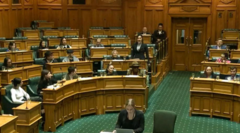New Zealand's parliament has voted to suspend three Māori MPs following their performance of a haka in protest during a sitting last year. The MPs, Hana-Rawhiti Maipi-Clarke, Rawiri Waititi, and Debbie Ngarewa-Packer, representing Te Pāti Māori (Māori Party), faced bans of seven and 21 days for their actions, which were considered "intimidating" by a parliamentary committee.
The protest was sparked by a controversial bill that sought to redefine New Zealand’s founding treaty, the Treaty of Waitangi, which delineates the relationship between the Māori people and the Crown. This bill has been a focal point in the ongoing struggle over indigenous rights in New Zealand and was voted down by a significant margin of 112 votes against 11 in April, only days after a committee recommended its dismissal.
Maipi-Clarke, who initiated the haka in question, expressed her dismay over the suspensions during a passionate speech in parliament, questioning whether their voices were being silenced: "We will never be silenced, and we will never be lost," she declared, visibly moved. The event has drawn widespread media attention, especially after a video of the haka went viral last November, highlighting the tensions in New Zealand's political landscape concerning Māori rights.
In support of the government’s move, Foreign Minister Winston Peters labeled the Māori Party as "a bunch of extremists," igniting further debate within the house. Critics of the Treaty Principles Bill argued that it would exacerbate racial divisions and undermine support structures for Māori communities, while proponents claimed it was necessary for legal clarity regarding the Treaty’s implications.
The Māori Party currently holds six of the 123 seats in parliament. The unprecedented lengths of the suspensions, surpassing the previous record of three days, reflect the deepening rift between the Māori community and the conservative government, which has been scrutinized for its handling of indigenous issues.
As public sentiment continues to clash over these developments, the ongoing discourse surrounding the Treaty and its significance remains crucial for New Zealand's future political and social landscape.




















